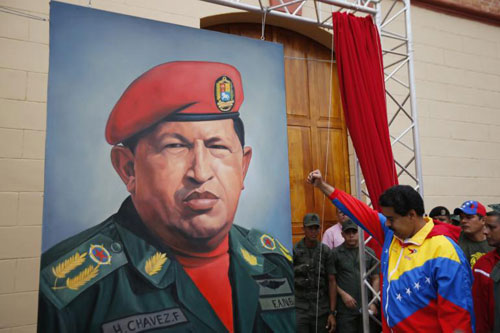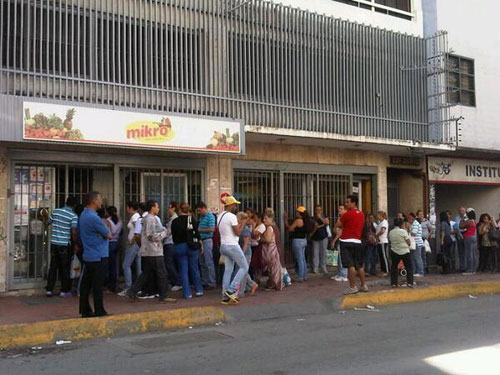by Gustavo A. Solimeo

Venezuelans are happy, or at least, will be soon. This claim is guaranteed by President Nicolás Maduro, “heir” of Hugo Chávez, who recently created a “Deputy Ministry of Supreme Social Happiness.”
Although bizarre, this measure should not surprise anyone since, as is virtually everything in Venezuela, happiness becomes a matter of national interest and, as such, should be managed by the government. This maneuver accurately reflects the socialist mentality: for every problem, there is always a bureaucratic, interventionist and inefficient solution. Very often, socialists imagine their own daydreams and wishful thinking to be the happiness of the people.
Announced on October 25, in the capital city of Caracas,[1] this new superagency will be added to the 39 ministries and federal mega-agencies already in place and will oversee and attempt to solve the problems of the 30 government social programs created by Maduro’s predecessor, messianically referred to as “missions.”
He stated that the new ministry will “take care of our elderly men and women and take care of our boys and girls” in the spirit of “the most sublime and loved revolutionary people,” moving “beyond the capitalist order.”[2]
The former bus driver and new leader of Venezuela was so eager to make his countrymen happy, that a week after instituting the happiness ministry, he decreed an early Christmas season because that is a time when everyone feels happy. Thus, on All Saints Day, in the middle of fireworks and Christmas carols, he inaugurated the “Navidad temprana,” an early Christmas to give people “the supreme social happiness.”[3]

The bus driver turned president, Nicolás Maduro, who considers himself called to perpetuate the mission of the late Chávez by spreading Twenty-first Century Socialism.
Maduro proclaimed “Early Christmas, early victory, early happiness for the whole family,” and he expects the last two months of the year to be a foretaste of the atmosphere of happiness he promises that will reign throughout 2014. Maduro reiterated that all resources would be available for education, health-care and “the right to food for our people.”
This lame rhetoric sounds almost like a confession of failure of the socialist Bolivarian regime. In fact, oil-rich Venezuela suffers from a chronic lack of basic goods and medical supplies, the shelves in markets and grocery stores are perpetually empty and Venezuelans have little to buy.[4]
“The scarcity of products becomes increasingly chronic due to the impossibility of the State importing all products required by the country. […] The economic situation is pushing the country closer to a rationing system similar to Cuba,” comments Antonio Maria Delgado in El Nuevo Herald.[5]
Incessant problems of personal insecurity,[6] unemployment and interruptions in the supply of basic services and goods are creating heightened social unrest. It is no surprise that Venezuelans are skeptical of the announcement of yet another gigantic bureaucratic initiative and do not believe in the promise of happiness by decree.
The comments heard on the streets of Caracas and Internet postings[7] show that Venezuelans are upset with the situation of the country and do not hide their dissatisfaction and indignation with the government.[8] The latest slight of hand is seen as a thinly veiled measure attempting to mask the failure of Bolivarian socialism coupled with a derision of people’s difficulties.
A 31-year-old housewife, Liliana Alfonzo, remarked that instead of a ministry of supreme happiness, she would prefer to be able to get milk and toilet paper, which disappears from the shelves minutes after hitting the stores. “It's an ordeal to get the ingredients for any meal,” she added.
Meanwhile, Sebastiana Barráes asks indignantly, “How can they decree supreme happiness with inflation at 50% and so much insecurity [in the streets] with impunity?”
Former television host Leopoldo Castillo described the creation of a new government bureaucracy as a “shameful” move that exposes Venezuela to “international ridicule.”
Maita Yuleima adds, “The stupidities that this man invents seem to have been taken from a children's story.”

“How can they decree supreme happiness with inflation at 50% and so much insecurity [in the streets] with impunity?”
María Corina Machado goes further; “The True Happiness Ministry for the Venezuelan people is the one that will send Maduro packing.”
Carlos Peñaloza agrees; “The supreme happiness of Venezuelans will be reached when he abandons the presidency.”
Unfortunately, leaving the presidency is precisely what Maduro does not want. He considers himself called to perpetuate the mission of the late Chávez by spreading Twenty-first Century Socialism.
He won the presidential election last April in the wake of Chávez’ death but it was a narrow victory in an election fraught with controversy. His main opponent, Henrique Capriles, was reluctant to accept the election results because of numerous irregularities in the vote suggesting fraud and a full audit of the vote never took place.
Meanwhile, as noted by Delgado, Chavism is losing the support among the poor, thus seriously threatening the continuity of Bolivarian socialism. Consequently “The regime of Nicolas Maduro is rapidly losing the support of popular sectors that Chávez enjoyed, with 56 percent of the lowest stratum of the population stating that the inefficiency of the current ruler and his administration is partially responsible for the economic crisis in the country.”[9]
In an attempt to reverse the situation, the bus driver-turned-president seeks to strengthen his local bases with the municipal elections in December, looking to capitalize once more upon the memory of the “charismatic” Colonel-President Chavez. Journalist Juan Nagel remarks in Foreign Policy Magazine “public opinion polls are showing Venezuelans are upset, and Maduro knows it. That is why he has declared Dec. 8, the day of the municipal election, as the ‘Day of Loyalty and Love toward Supreme Commander Hugo Chávez and the Homeland.’”[10]
“Loyalty” and “love” poorly disguise the threat lurking between the lines, “by blatantly linking the election to the still-popular Chávez, he hopes to equate a vote against his government as treason.”[11] In classic Castro style.
1.
http://www.telegraph.co.uk/news/worldnews/southamerica/venezuela/10406386/Venezuela-creates-Social-Happiness-ministry.html, http://www.ibtimes.com/how-economic-crisis-venezuela-affecting-everyday-life-there-no-flour-no-oil-no-sugar-1442890, http://www.thedailybeast.com/articles/2013/10/31/venezuela-unveils-orwellian-ministry-of-supreme-social-happiness.html↑
2.
http://www.telegraph.co.uk/news/worldnews/southamerica/venezuela/10406386/Venezuela-creates-Social-Happiness-ministry.html, http://www.ibtimes.com/venezuela-opens-deputy-ministry-supreme-social-happiness-keep-track-social-programs-1442342, http://www.thedailybeast.com/articles/2013/10/31/venezuela-unveils-orwellian-ministry-of-supreme-social-happiness.html↑
3.
http://noticias.univision.com/america-latina/venezuela/article/2013-11-02/maduro-inaugura-en-venezuela-la-navidad-temprana-para-dar-suprema-felicidad#axzz2jiTptVMr↑
4.
http://www.ibtimes.com/how-economic-crisis-venezuela-affecting-everyday-life-there-no-flour-no-oil-no-sugar-1442890, http://internacional.elpais.com/internacional/2013/10/26/actualidad/1382808402_164579.html↑
5.
http://www.elnuevoherald.com/2013/11/06/v-print/1607972/el-chavismo-pierde-respaldo-entre.html↑
6.
http://noticias.univision.com/america-latina/venezuela/slideshow/2013-08-14/robo-cabello-venezuela-mujeres-piranas↑
7.
http://www.eldiario.ec/noticias-manabi-ecuador/291531-la-felicidad-jaja-jaja/, http://www.telegraph.co.uk/news/worldnews/southamerica/venezuela/10406386/Venezuela-creates-Social-Happiness-ministry.html↑
8.
http://transitions.foreignpolicy.com/posts/2013/11/05/venezuelans_are_upset_and_maduro_knows_it?wp_login_redirect=0↑
9.
http://www.elnuevoherald.com/2013/11/06/v-print/1607972/el-chavismo-pierde-respaldo-entre.html↑
10.
http://transitions.foreignpolicy.com/posts/2013/11/05/venezuelans_are_upset_and_maduro_knows_it?wp_login_redirect=0↑
11.
http://transitions.foreignpolicy.com/posts/2013/11/05/venezuelans_are_upset_and_maduro_knows_it?wp_login_redirect=0↑

No comments:
Post a Comment